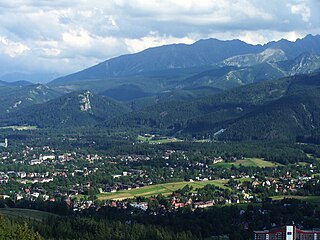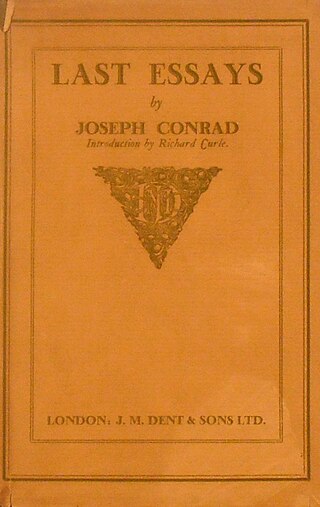Related Research Articles

Joseph Conrad was a Polish-British novelist and story writer. He is regarded as one of the greatest writers in the English language and although he did not speak English fluently until his twenties, he became a master prose stylist who brought a non-English sensibility into English literature. He wrote novels and stories, many in nautical settings that depict crises of human individuality in the midst of what he saw as an indifferent, inscrutable and amoral world.

Zakopane is a town in the south of Poland, in the southern part of the Podhale region at the foot of the Tatra Mountains. From 1975 to 1998, it was part of Nowy Sącz Voivodeship; since 1999, it has been part of Lesser Poland Voivodeship. As of 2017 its population was 27,266. Zakopane is a centre of Goral culture and is often referred to as "the winter capital of Poland". It is a popular destination for mountaineering, skiing, and tourism.

Ford Madox Ford was an English novelist, poet, critic and editor whose journals The English Review and The Transatlantic Review were important in the development of early 20th-century English and American literature.

Aleksander Głowacki, better known by his pen name Bolesław Prus, was a Polish novelist, a leading figure in the history of Polish literature and philosophy, as well as a distinctive voice in world literature.
Edward William Garnett was an English writer, critic and literary editor, who was instrumental in the publication of D. H. Lawrence's Sons and Lovers.

Pharaoh is the fourth and last major novel by the Polish writer Bolesław Prus (1847–1912). Composed over a year's time in 1894–95, serialized in 1895–96, and published in book form in 1897, it was the sole historical novel by an author who had earlier disapproved of historical novels on the ground that they inevitably distort history.

Swept from the Sea is a 1997 drama film directed by Beeban Kidron and starring Vincent Perez, Rachel Weisz, and Ian McKellen. Based on the 1901 short story "Amy Foster" by Joseph Conrad, the film is about a doomed love affair between a simple country girl and a Ukrainian peasant who is swept onto the Cornish shore in 1888 after his emigrant ship sinks on its way to America.

Romance is a novel written by Joseph Conrad and Ford Madox Ford. It was the second of their three collaborations. Romance was eventually published by Smith, Elder & Co. in London in 1903 and by McClure, Phillips and Company in New York in March 1904.
The works of Joseph Conrad encompass novels, short stories, nonfiction, and memoirs. Although he was born in Ukraine and spoke Polish and French fluently from childhood, he wrote in English, which he did not learn until his twenties. Philosopher Wincenty Lutosławski recalled Conrad explaining this, saying "I value our beautiful Polish literature too much to bring into it my clumsy efforts. But for the English my gifts are sufficient and secure my daily bread."

Last Essays is a volume of essays by Joseph Conrad, edited with an introduction by Richard Curle, and published posthumously in 1926.

Zdzisław Najder was a Polish literary historian, critic, and political activist.

Joseph Conrad Square is a small triangular square at Columbus Avenue and Beach Street, near Fisherman's Wharf in San Francisco, California.

Joseph Conrad was a Polish author who wrote in English after settling in England. He is regarded as one of the greatest writers in English, though he did not speak the language fluently until he was in his twenties, and always with a marked Polish accent. Before embarking on writing, he had a career sailing in the French, then the British, merchant marine. Of his 19-year merchant-marine career, about half that time was spent actually at sea.

Bronisława Dłuska was a Polish physician, and co-founder and first director of Warsaw's Maria Skłodowska-Curie Institute of Oncology.

The Nature of a Crime is a collaborative novel written and published in 1909 by authors Joseph Conrad and Ford Madox Ford. The text did not acquire acclaim until after Conrad's death in 1924, when Ford brought the text to light in his essay "Joseph Conrad: A Personal Remembrance". The Nature of a Crime is the last of three books written by Conrad and Ford.
Robert Gavin Hampson FEA FRSA is a British poet and academic. Hampson was born and raised in Liverpool, studied in London and Toronto and settled in London. He is currently Professor Emeritus at Royal Holloway. He was Visiting Professor at the University of Northumbria (2018-21) and Research Fellow at the Institute for English Studies, University of London (2019-23). He is a member of the Poetics Research Centre and the Centre for GeoHumanities at Royal Holloway. He is well known for his contributions to contemporary innovative poetry and the international study of Joseph Conrad.

Aniela Zagórska was a Polish translator who rendered into Polish nearly all the works of Joseph Conrad.

The Société anonyme belge pour le commerce du Haut-Congo (SAB) was a private enterprise in the Congo Free State, later the Belgian Congo, that operated a string of trading stations in the Congo River basin, and exported ivory, rubber and other local products. The ruthless treatment of the local people by SAB agents inspired Joseph Conrad to write his 1899 novel Heart of Darkness.
Halina Najder, née Halina Teresa Paschalska, later Halina Carroll was a Polish-British translator of English literature and a veteran of the Warsaw Uprising 1944.

Elsie Martindale Hueffer was an early translator of Guy de Maupassant’s short stories into English. She was married to the novelist and poet Ford Madox Ford (1873-1939).
References
- ↑ John Gerard Peters, The Cambridge Introduction to Joseph Conrad, Cambridge University Press, 2006, p. 71.
- ↑ Gustav Morf, The Polish Shades and Ghosts of Joseph Conrad, Astra Books, 1976, pp. 225-26.
- ↑ Zdzisław Najder, Joseph Conrad: A Life, p. 227.
- ↑ Zdzisław Najder, Joseph Conrad: A Life, pp. 312-13.
- ↑ Ford Madox Ford, The Cinque Ports , p.163.
- ↑ Edward Said, "Between Worlds: Edward Said makes sense of his life", London Review of Books , vol. 20, no. 9, 7 May 1998, pp. 3-7.